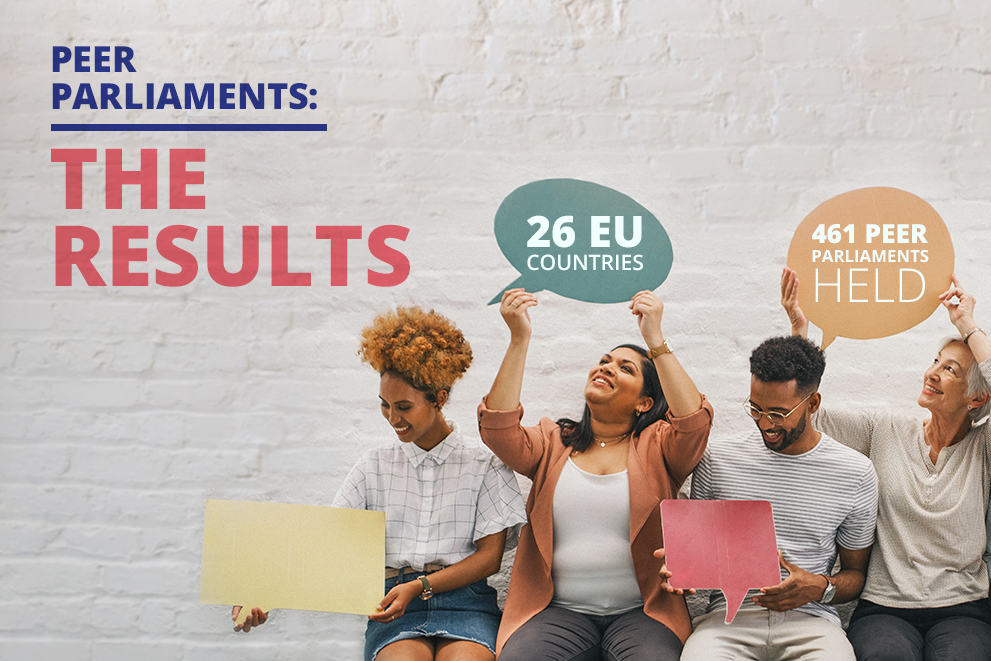
How can we tackle the climate crisis by changing the way we travel, eat and use energy? This question was at the heart of hundreds of Peer Parliament debates held across Europe from November 2021 to March 2022. Groups of friends, family members and colleagues came together to discuss how to make our transport, energy, food and consumption more sustainable – and their views have been heard by not only by climate policy experts at the European Commission, but also by the Commission’s Executive Vice-President in charge of the European Green Deal, Frans Timmermans.
“This transition affects everyone. It’s going to impact everyone’s life. It’s going to impact all the choices we make. What we eat, how we live, how we move around,” explained Executive Vice-President Frans Timmermans at the online event Shaping the EU’s Climate Transition: Citizens Take the Floor, on 29 April. “To have the possibility to incorporate the citizens in the design ensures their support,” he added.
WHAT IDEAS DID CITIZENS HAVE?
Sustainable travel
- Integrated rail networks across Europe, more night trains and easy booking
- More bike garages at workplaces
- A quota for the number of flights a person can take each year – and a market to exchange the rights to fly
- Flexible working to reduce travel
Sustainable Energy
- Incentives to switch to renewables
- Support for low-income families to buy energy-saving devices
Sustainable consumption
- More consumer information and education
- Personal emissions budgets and tradable allowances
- Legal action against greenwashing
What was it like to host a Peer Parliament?
Merilin Paalo from Estonia organised a Peer Parliament with her Baltic League volleyball team on the nine-hour bus journey to a match in Lithuania. Her group felt very strongly about low-cost plane tickets.
“You can buy a plane ticket from Estonia to Italy for about €10 – that is too tempting. Air fares clearly don’t take environmental impacts into account, and this isn’t fair.” Everyone in her group said they would take the train if it was cheaper, because it’s more scenic and comfortable.
For Merilin, the discussion was both stimulating and enjoyable. “We focused on sustainable mobility, which was a great theme for our bus journey! We all enjoyed the opportunity to share information, discuss and discover some of the biggest hurdles to climate action we all face.”
Many of her fellow volleyball players were frustrated with public transport in Tallinn. “Taking public transport involves changing a lot and waiting for ages. And we don’t even have night buses, so doing something like going to the cinema is really difficult without a car.” One suggestion her team came up with is city bike-rental schemes that extend to the suburbs (where many of her teammates live), along with more bike lanes.
In fact, Tallinn is keen to keep improving its sustainable mobility infrastructure. Since 2013, public transport has been free for inhabitants, but now, the city has even set itself the goal that citizens should be able to reach all necessary infrastructure within 15 minutes by using soft transport modes, such as cycling, walking, roller-skating. The “Tallinn 2035” strategy also addresses the city’s plans to reduce its greenhouse gas emissions and become climate neutral in the future, as well as its action on climate adaptation, biodiversity protection, sustainable energy and food production – among much more.
And this approach is being noticed and rewarded. For leading the way in environmentally friendly urban living, as well as for its commitment to ambitious environmental improvement, Tallinn has received the European Green Capital 2023 award.
PEER PARLIAMENTS IN NUMBERS
461 -The total number of Peer Parliaments that were held across 26 EU countries
78 - The largest number of Peer Parliaments held in one country (Poland)
Italian Climate Pact Ambassador Maria Giulia Fiore organised a Peer Parliament with a group of school children aged 10-14 and their families. “I thought that talking to little ones would be a good lever for influencing older generations. The atmosphere was certainly exciting – they were curious and eager to share their solutions!”
Her group wanted to see people eat more vegetables and less meat, potentially thanks to subsidies for ecological agriculture, lower taxes on non-animal products, and bans on pesticides. Making restaurants and supermarkets donate, compost or recycle leftover food was another idea.
Maria noted that young people care deeply about the conditions of animals living in on intensive farms and the negative impact that eating meat has on nature: “For the future of citizen engagement on climate issues, we must make young people protagonists and use formats like Peer Parliaments to take their concerns seriously.”
DID YOU KNOW…?
Across all Peer Parliaments, sustainable food and consumption was the most discussed topic.
In Slovakia, people called for a ban on using energy made from fossil fuels.
Italy and Slovenia’s Peer Parliaments thought coal-dependent regions should receive more support to make the green transition.
Malta and Portugal’s Peer Parliaments supported a ban on single-use plastic bottles.
What were the results and how can I get involved?
All of the Peer Parliament results fed into the Conference on the Future of Europe – an opportunity for European citizens to debate Europe’s challenges and priorities, which concluded on 9 May 2022. Through the conference’s multilingual digital platform, results are now available to anyone, anywhere in Europe.
Europe’s future climate policies will only succeed if we design them for people and with people. So why not host your own Peer Parliament with friends, family, neighbours, students or colleagues and share the results on social media using the hashtags #EUClimatePact and #PeerParliaments?
Use our learning materials and facilitation guide to learn how to organise a Peer Parliament, have a look at our report, and find more information and support materials on our Resources page.
Details
- Publication date
- 30 May 2022
